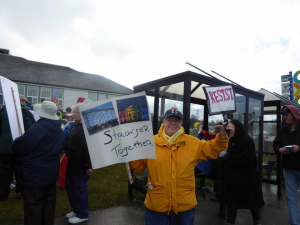 The only one likely to get any treats this Valentine’s Day is the cat. As my sweetheart said, now that we’re getting old and fat, we need to think of new ways to celebrate loving occasions. So, we treated ourselves to an iRobot Roomba 650. More expensive than a red heart full of chocolates, but oh, so rewarding, so low calorie.
The only one likely to get any treats this Valentine’s Day is the cat. As my sweetheart said, now that we’re getting old and fat, we need to think of new ways to celebrate loving occasions. So, we treated ourselves to an iRobot Roomba 650. More expensive than a red heart full of chocolates, but oh, so rewarding, so low calorie.
Could we afford this luxury robot? It was on sale and we had a gift card. Did we need it? No, my sweetheart actually likes vacuuming. Did she think it was just another gadgety toy that caught my eye? No, I barely saw the robot until she had it up and running. Don’t believe everything you hear about lesbian family roles.
I admit, the Roomba was my idea. At the Left Coast Lesbian Literary Conference last year, I overheard a literary dyke enthusiastically praising the product and its sale price. I emailed myself a reminder to check it out. My sweetheart was not excited, but I foresaw a future which included making all sorts of messes—repotting plants, constructing signs for protests, eating crumbly non-fat crackers—without guilt or the anticipation of cleaning up with a loud, heavy, inadequate trump-like device.
She sings. Not my sweetheart, but the little helper she named Vic the Vac. You put Vic on the floor and she sings a happy fluty sound that makes us think she’s thrilled to be doing her job. She’s grateful to us for setting her free, free! And she sets about her duties assiduously. All we need to do, besides empty her nether parts, is keep out of her way. Vic does a better job of cleaning than the best of the big vacuums we’ve tried.
Of course, as with any new—would you call her a pet—there are moments of panic. The robot comes with an electronic thingy that creates a virtual barricade to keep her out of areas where you don’t want her marauding. (An electronic wall anyone?)
But seriously, when Vic gets stuck under a bookcase, my sweetheart longs, and I quote, to be able to program Vic with messages like “owie” when she’s stuck, or “uppie” when she‘s done and wants to be carried home from behind her barricade to her charging station. My sweetheart also wishes we could teach Vic to say, “I can’t believe I ate the whole thing,” to signal that her canister is full. As if that were an issue; we turn her on to do her happy dance whenever we see a spot. Our home hasn’t been this consistently clean in ten years.
How is our robot a fit gift for Valentine’s Day? For one thing, it frees up some together time. Time that, these days, is so tethered to the necessity of political activism. Instead of walking the beach hand in hand or sitting close by the (gas) fireplace, remembering falling in love and our wedding, we’re calling senators from coast to coast to beg, thank, or encourage them to save the America we love.
It was kind of romantic, though, that first protest march we attended together. We live in a place that is about as populous as half a neighborhood in my hometown of NYC. The Women’s March was anticipated to draw, at most, a couple hundred residents. As we waved our signs at passing motorists, people kept streaming toward us. Whole families, singles, packs of friends, all genders, all colors, packed the front of City Hall in the rain. Sixteen hundred of us. Several came from our 55+ neighborhood. A ninety-six-year-old woman in a wheelchair waved her sign, grinning her head off.
We held hands, my sweetheart and I, as we marched along the Coast Highway, the only coastal route from Mexico to Canada. Our little adopted town, where we have made our home, wasn’t standing still for the coup of ignorance in our capitol.
The police and volunteers were, if not friendly, competent. They might have been scared of our unprecedented numbers. Some of the drivers who passed shouted obscenities and made emphatically offensive gestures. There was one man with a sign supporting the Bundy brothers’ occupation of Malheur National Forest. We protesters were peaceful and did not engage.
The discouraging part, as my college roommate, who marched in NYC, said, was, “What now?”
Romantic activism, hardly a new form of courting and togetherness, is in our future. As are dieting, more walking in the rain hand in hand, and perhaps celebrating Valentine’s Day in our living room with a waltz or a rumba to the happy love song of the Roomba.
Lee Lynch wrote the classic novels The Swashbuckler and Toothpick House. Her new novel, Rainbow Gap, is now available at women’s and gay bookstores and at boldstrokesbooks.com. Most recently she was made namesake and first recipient of the Golden Crown Literary Society Lee Lynch Classic Award for her novel The Swashbuckler. A three time Lammy finalist, she is also a recipient of the James Duggins Mid-Career Award in Writing and many more honors.











